
The politics of Belgium take place in the framework of a federal, representative democratic, constitutional monarchy. The King of the Belgians is the head of state, and the prime minister of Belgium is the head of government, in a multi-party system. Executive power is exercised by the government. Federal legislative power is vested in both the government and the two chambers of parliament, the Senate and the Chamber of Representatives. The federation is made up of (language-based) communities and (territorial) regions. Philippe is the seventh and current King of the Belgians, having ascended the throne on 21 July 2013.
Vooruit is a Flemish social democratic political party in Belgium. It was known as the (Flemish) Socialist Party until 21 March 2021, when its current name was adopted.

The Flemish Movement is an umbrella term which encompasses various political groups in the Belgian region of Flanders and, less commonly, in French Flanders. Ideologically, it encompasses groups which have sought to promote Flemish culture and the Dutch language as well as those seeking greater political autonomy for Flanders within Belgium. It also encompasses nationalists who seek the secession of Flanders from Belgium, either through outright independence or unification with the Netherlands.

The Socialist Party is a social democratic French-speaking political party in Belgium. As of the 2024 elections, it is the fourth largest party in the Belgian Chamber of Representatives and the second largest Francophone party. The party is led by Paul Magnette. The party supplies the Minister-president of the French Community, and the Brussels-Capital Region. In the German-speaking community, the party is known as the Sozialistische Partei (SP).

The Workers' Party of Belgium is a Marxist and socialist political party in Belgium. It is the only Belgian party represented in parliament that is a fully national party, representing both Flanders and Wallonia. Having historically been a small party, the PTB-PVDA has gained momentum since the 2010s, continuously scoring better at the elections, particularly in Wallonia and working-class communities in Brussels.

Flanders is both a cultural community and an economic region within the Belgian state, and has significant autonomy.

Flemish political parties operate in the whole Flemish Community, which covers the unilingual Flemish Region and the bilingual Brussels-Capital Region. In the latter, they compete with French-speaking parties that all also operate in Wallonia. There are very few parties that operate on a national level in Belgium. Flanders generally tends to vote for right-wing, conservative parties, whereas in French-speaking Belgium the socialist party is usually the most successful one.
The politics of Wallonia concern the government of Wallonia, that is the southern Region of Belgium.
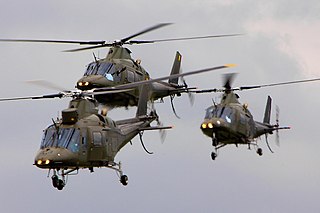
The Agusta scandal, alternatively known as the Agusta–Dassault Case, was a major political scandal which occurred in Belgium during the 1990s, based on allegations that two multinational companies had used bribery to secure large defence procurement contracts. The companies in question, Agusta and Dassault, bribed numerous political office-holders in 1988 in order to secure a large order of Agusta A109 helicopters and the contract for re-fitting Belgian F-16 Fighting Falcon fighter jets respectively. The scandal came to light during investigations into the death of the socialist politician André Cools in 1991 and an official enquiry was opened in 1993. Numerous senior figures in both Walloon and Flemish socialist parties were implicated, including the incumbent Secretary General of NATO Willy Claes who was forced to resign.

Federal elections were held in Belgium on 10 June 2007. Voters went to the polls in order to elect new members for the Chamber of Representatives and Senate.
The partition of Belgium is a hypothetical situation, which has been discussed by both Belgian and international media, envisioning a split of Belgium along linguistic divisions, with the Flemish Community (Flanders) and the French-speaking Community (Wallonia) becoming independent states. Alternatively, it is hypothesized that Flanders could join the Netherlands and Wallonia could join France or Luxembourg.

The Christian Social Party was a major centre-right political party in Belgium which existed from 1945 until 1968.
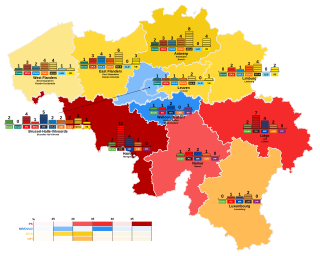
Federal elections were held in Belgium on 13 June 2010, during the midst of the 2007-11 Belgian political crisis. After the fall of the previous Leterme II Government over the withdrawal of Open Flemish Liberals and Democrats from the government the King dissolved the legislature and called new elections. The New Flemish Alliance, led by Bart De Wever, emerged as the plurality party with 27 seats, just one more than the francophone Socialist Party, led by Elio Di Rupo, which was the largest party in the Wallonia region and Brussels. It took a world record 541 days until a government was formed, resulting in a government led by Di Rupo.
Following the Belgian general election held on 13 June 2010, a process of cabinet formation started in Belgium. The election produced a very fragmented political landscape, with 11 parties elected to the Chamber of Representatives, none of which won more than 20% of the seats. The Flemish-Nationalist New Flemish Alliance (N-VA), the largest party in Flanders and the country as a whole, controlled 27 of 150 seats in the lower chamber. The Francophone Socialist Party (PS), the largest in Wallonia, controlled 26 seats. Cabinet negotiations continued for a long time. On 1 June 2011, Belgium matched the record for time taken to form a new democratic government after an election, at 353 days, held until then by Cambodia in 2003–2004. On 11 October 2011, the final agreement for institutional reform was presented to the media. A government coalition was named on 5 December 2011 and sworn in after a total of 541 days of negotiations and formation on 6 December 2011, and 589 days without an elected government with Elio Di Rupo named Prime Minister of the Di Rupo I Government.

The Belgian provincial, municipal and district elections of 2012 took place on 14 October. As with the previous 2006 elections, these are no longer organised by the Belgian federal state but instead by the respective regions:
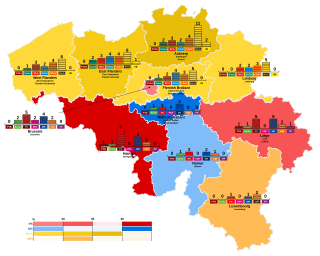
Federal elections were held in Belgium on 25 May 2014. All 150 members of the Chamber of Representatives were elected, whereas the Senate was no longer directly elected following the 2011–2012 state reform. These were the first elections held under King Philippe's reign.
Regional elections were held in Belgium on 25 May 2014 to choose representatives for the Flemish Parliament, Walloon Parliament, Brussels Parliament and the Parliament of the German-speaking Community. These elections were held on the same day as the 2014 European elections as well as the 2014 Belgian federal election.
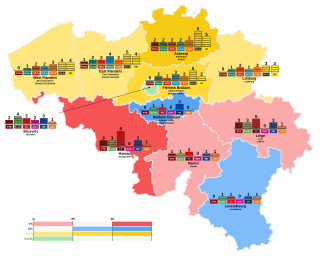
Federal elections were held in Belgium on 26 May 2019, alongside the country's European and regional elections. All 150 members of the Chamber of Representatives were elected from eleven multi-member constituencies.
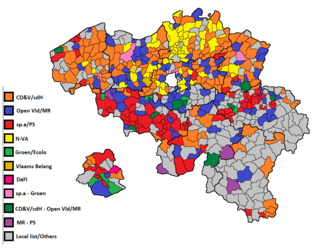
The Belgian provincial, municipal and district elections of 2018 took place on Sunday 14 October 2018. They are organised by the respective regions:














